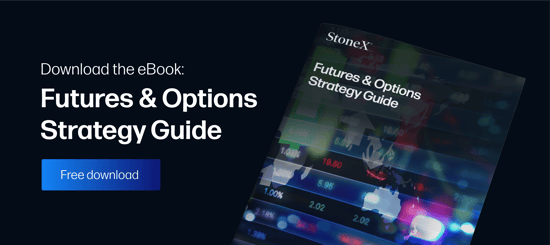As you start following the futures markets, you will find that brokers, traders, and individuals in the futures/commodities industry have certain “speak”. Much like the military, where exotic terms for everything are the norm, traders have their own language that could confuse a beginner. Specific market terms are difficult to comprehend at first but are required in order to communicate with other traders. I have listed some terms below that a new trader should learn.
- Ask: Sometimes referred to as the “offer”. This is the price where someone is willing to sell an option or futures contract.
- At the Money: The description of an option when its strike price equals the futures price.
- Basis: The difference between the cash price of a commodity and its futures price. When basis is positive, the spot cash price is more expensive than the futures price.
- Bid: The price at which a buyer is willing to pay.
- Carry: Sometimes referred to as “cost of carry”. This is the cost it takes to hold a commodity until delivery. It is a combination of costs including interest, storage and insurance.
- Commercials: Any company that uses the physical commodity in a production, processing, or exporting capacity.
- Day Order: A futures or options order that will only execute during the current session. Day orders that expire unfilled are called “unable”.
- Deferred Contract: Any contract not traded as the front month contract.
- Fill: The price at which a contract was bought or sold.
- First Notice Day: This is the first day in which a commercial or end user of a commodity must provide the exchange with the intent to deliver or take delivery. Typically, all speculative interest should be out of the contract by this day.
- Flat Account: An account with no positions on the books.
- Initial Margin: The amount of money required to be in the account to hold a position over night.
- Last Trading Day: The day on which trading stops for a futures contract or option — this is after the first notice day. Most traders should avoid trading the contract until this point unless they plan to take delivery.
- Limit Move: A trade at the maximum price fluctuation for the day. A contract will be considered “limit up” or “limit down” if a contract makes its maximum limit move.
- Liquid market: A market where one can buy or sell a contract easily. Liquid markets have good volume and a narrow bid/ask. Liquidity can become an issue when trying to buy or sell multiple contracts at one price. The market is an auction; the number of participants will determine liquidity.
- Nearby Contract: Also referred to as the “front month”. The nearest, most active contract traded.
- Mark to Market Accounting: The daily reconciliation of open positions in reference to profit or loss. Unlike equities accounts, every futures account is market to market daily. A common misnomer is that profits or losses aren’t realized until a trader closes a futures position. Mark to market accounting means that the cash value of the account fluctuates with the value of positions on the books.
- Out of the Money: An option is out of the money if the price of the underlying futures contract is above a put strike price or below a call strike price.
- Open Interest: The total number of futures or options that have not been closed or delivered upon. A market with historically high open interest can sometimes indicate a near term top or bottom on the horizon.
- Position Limit: The maximum number of contracts a trader can hold. This is determined by the CFTC board of governors and the exchanges. These limits have been in the news recently as the CFTC has lowered these limits from previous levels.
- Roll: The simultaneous exit and entry of a position in different contract months. A roll takes place when a trader exit and enter positions in the same commodity in the new front month to avoid taking delivery.
- Short Covering: Traders with short positions in the market buy the contract back to exit positions. Sometimes markets can move sharply higher, not from fresh buying, but shorts exiting the market. This is called a short covering rally or a short squeeze.
- Spread: This term has two definitions. The “spread” is another word for the bid/ask. Asking your broker ‘what’s the spread?’ will be a question of what the market wants to buy or sell. The term “spread” can also refer to a type of trade that involves the simultaneous purchase and sale of two or more options or futures positions.
- Strike Price: The price at which an option will expire in or out of the money.
- Tick: The minimum amount of price fluctuation in a futures or options contract.
